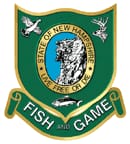August is an Important Month for Wild Turkey Brood Sightings in New Hampshire
OutdoorHub 08.06.12

The New Hampshire Fish and Game Department is urging people to report sightings of hen turkeys, with or without young, from now through the end of August through its web-based turkey brood survey at http://www.wildnh.com/turkeybroodsurvey.
“August tends to be the most important of the summer months for the survey,” said Fish and Game biologist Ted Walski. “By August, those young who have survived are pretty assured of becoming adults, so August sightings will provide the best index to the summer breeding productivity.”
Most sightings will be of “multiple hen” broods during August. It is common for hen turkeys to join together with their young later in the summer. This joint brood flock will often have poults of various sizes. Also, hens that have not successfully nested or that have lost their young will join a brood flock and act as a foster mother.
“Do not be surprised to observe some broods in August and September with small poults the size of quail or pigeons,” explained Walski. “Re-nesting is common with wild turkeys. If something causes nest destruction or abandonment during May/June, the majority of hens will go and lay another clutch of eggs and hatch out in July or August.”
Last summer was the first year of Fish and Game’s web-based turkey brood survey, which yielded a total of 808 turkey broods reported from all parts of the state between May and August. This year, biologists are hoping to see an increase in the number of reports of turkey broods, particularly in northern New Hampshire and along the western side of the state in Sullivan and Grafton counties. So far, nearly 400 turkey brood sightings have been reported – just under half of the reports that were received last year.
“So far, the majority of sightings have come from southern New Hampshire, which corresponds to higher densities of both turkeys and people,” said Mark Ellingwood, Wildlife Division Chief at N.H. Fish and Game. “All the reports are helpful, but we especially need more observations from north of the Lakes Region and along the Connecticut River.”
At the end of July, 382 turkey brood observations had been reported in New Hampshire. Only 13% were from the northern half of the state. Regionally, so far there have been just 5 reports from the North Region, 22 from West Central New Hampshire (Lebanon to Lancaster), 19 from the White Mountains region, 82 from southwestern New Hampshire, 64 from the East Central region (Freedom to Farmington) and 190 from southeastern New Hampshire.
Some helpful background for turkey observers: The term “brood” refers to a family group of young turkeys accompanied by a hen. New Hampshire hens generally begin laying eggs from mid-April to early May and complete their clutch of about 12 eggs in early to mid-May. Incubation lasts for 28 days, and most nests hatch from late May to mid-June. If incubating turkey eggs are destroyed or consumed by predators, hens often lay a replacement clutch of eggs that hatch late June through late August. The mildest winter in 40+ years, and the earliest spring “green-up” stimulated early turkey breeding and nesting. Most of this year’s hatching occurred around the middle of May. An early summer sample of 35 single hen broods from May/June gave a favorable average of 6.7 poults per hen.
New this summer, the survey includes a section intended to help assess public attitudes about wild turkeys in the state. Conducted in cooperation with the University of New Hampshire, data from the Summer Turkey Brood Survey and the 2012 Winter Turkey Flock Survey relating to public attitudes will be compiled and analyzed as part of a Master’s of Science project to assess public attitudes and interest in monitoring wild turkeys. It will also provide Fish and Game biologists with information that will enhance their ability to recruit and retain “citizen scientists.” The combined use of biological and human dimensions surveys will aid both turkey management and promote public participation in wildlife management overall.
The public attitudes survey is an addendum to the 2012 Summer Turkey Brood survey and is optional. Participants who fill out the public attitudes survey can enter a drawing to win 1 of 2 prints titled “Mother’s Work Is Never Done,” which features a turkey hen and her chicks. The numbered and signed prints were graciously donated by New Hampshire wildlife artist Jim Collins, designer of the New Hampshire Conservation License Plate (moose plate) and several migratory waterfowl stamps.
Many thanks to all who have reported hens with young turkeys so far this year! NH Fish and Game appreciates all turkey brood observations reported by volunteers, as the information helps greatly in determining how successful turkey nesting was for the year, and also helps in determining the distribution and abundance of wild turkeys throughout the state.
The reporting period runs until August 31 and results will be posted on the Fish and Game website this fall. To report your turkey brood observations, go to http://www.wildnh.com/turkeybroodsurvey.
Wildlife research and management in New Hampshire is funded in part by Federal Aid in Wildlife Restoration, a user-pay, user-benefit program supported by your purchase of fishing tackle, firearms, ammunition, archery equipment and motorboat fuels.

